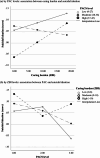Moderating role of positive aspects of caregiving in the relationship between caring burden and suicidal ideation in family caregivers of community-dwelling older adults with neurocognitive disorders
- PMID: 40660116
- PMCID: PMC12257795
- DOI: 10.1186/s12877-025-06147-6
Moderating role of positive aspects of caregiving in the relationship between caring burden and suicidal ideation in family caregivers of community-dwelling older adults with neurocognitive disorders
Abstract
Background: Psychological distress is common in family caregivers of individuals with neurocognitive disorders (NCDs). This study examined the prevalence of suicidal ideation in this population, and explored the moderating role of positive aspects of caregiving (PAC) in mitigating such severe psychological difficulties.
Methods: 445 older adults (NCDs: 322, normal cognition: 123) and their family caregivers were recruited from the population-based Hong Kong Mental Morbidity Survey for Older Persons. Caregivers' suicidal ideation was screened by positive response to Item 9 of the Patient Health Questionnaire-9: thoughts of being better off dead or self-harm in the past two weeks. PAC were measured using a validated scale. A conceptual model was developed to test the mediation and moderation effects among caregiving burden, psychological distress, suicidal ideation, and PAC.
Results: Nearly one in ten (9%) dementia caregivers reported suicidal ideation in the past two weeks. Higher prevalence was observed among female carers, those with comorbid mood disorders, and those caring for individuals with high comorbidity or functional dependence. Psychological distress significantly mediated the relationship between caregiving burden and suicidal ideation (80.5%, p = 0.023). PAC moderated this pathway: higher levels of PAC were associated with reduced suicidal ideation among carers with moderate-to-high caregiving burden (p < 0.05). However, a rebound in suicidal ideation was observed in caregivers experiencing both high burden and high PAC.
Conclusions: Suicidal ideation among NCD caregivers is closely linked to caregiving burden and psychological distress. PAC plays a complex and non-linear moderating role in this relationship. Psychological intervention that strengthens PAC should be integrated into comprehensive caregiver support programmes, particularly for those experiencing high burden and high distress.
Keywords: Carer; Cognitive impairment; Dementia; Positive gain; Suicide.
© 2025. The Author(s).
Conflict of interest statement
Declarations. Ethics approval and consent to participate: This study followed the Helsinki declaration and was approved by the Survey and Behavioural Research Ethics Committee and Clinical Research Ethics Committee of the Chinese University of Hong Kong (Ref: 2018.494). Informed consent to participate was obtained from all the participants in this study. Consent for publication: Not applicable. Competing interests: The authors declare no competing interests.
Figures


References
-
- Prince M, Wimo A, Guerchet M, Ali G-C, Wu Y-T, Prina M. World alzheimer report 2015. The global impact of dementia: an analysis of prevalence, incidence. cost and trends: Alzheimer’s Disease International; 2015.
-
- Schulz R, Martire LM. Family caregiving of persons with dementia: prevalence, health effects, and support strategies. Am J Geriatr Psychiatry. 2004;12(3):240–9. - PubMed
-
- Sallim AB, Sayampanathan AA, Cuttilan A, Ho R. Prevalence of mental health disorders among caregivers of patients with alzheimer disease. J Am Med Dir Assoc. 2015;16(12):1034–41. - PubMed
MeSH terms
Grants and funding
LinkOut - more resources
Full Text Sources
Medical
Miscellaneous

